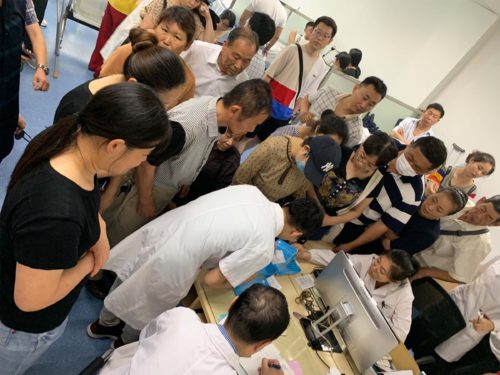There are several side effects associated with radiation therapy (also referred to as “radiotherapy” or “radiation”), a type of cancer treatment that helps kill cancer cells and shrink tumors. Radiation side effects vary from patient to patient, with some individuals suffering severe side effects and others experiencing hardly any side effects at all.

A busy day at a hospital in Hefei, China
A form of energy released in particles or waves, radiation therapy is often administered by a machine that aims radiation at your cancer. Radiation may also be administered internally, through radioactive substances placed inside your body. Because radiation can sometimes harm normal cells in the targeted area, the treatment may produce specific side effects.
While skin changes (such as itching, peeling, and blistering) and fatigue are common among all patients receiving radiation, other side effects tend to vary depending on the area of the body being treated.
Although most side effects tend to subside within two months of completing radiation therapy, specific side effects (such as infertility) may not set in until six or more months after you’ve finished your radiation treatment.
To guard your health and protect against side effects during radiation therapy, the American Cancer Society recommends the following strategies:
– Get plenty of rest and practice good sleep hygiene- follow a balanced diet rich in nutrients- take care of the skin in the treatment area- avoid wearing tight clothes, especially over the treatment area- protect the treated area from the sun, heat, and cold- You should also talk to your doctor about how to deal with specific side effects resulting from radiation therapy. Natural Treatment for Radiation Side Effects
To date, the use of alternative medicine in treating radiation side effects has not been extensively studied. Furthermore, since specific natural therapies may interfere with the effects of radiation treatment, it’s essential to talk with your doctor before using any alternative medicine while undergoing radiation (and to let him or her know about any natural remedies or alternative therapies you’re already using).
Here’s a look at several types of natural treatments studied for their effects on people receiving radiation therapy:
In a pilot study published in 2009, researchers assigned 19 cancer patients to four weeks of twice-weekly acupuncture sessions and found that the needle-based Chinese therapy helped alleviate radiation-induced xerostomia (a severe dry mouth that occurs when the salivary glands can’t produce enough saliva).
Other preliminary research suggests that acupuncture may also reduce radiation side effects like insomnia and fatigue.
Research on animals indicates that curcumin (an antioxidant and anti-inflammatory compound found in the curry spice turmeric) may help protect against radiation-induced damage to the skin. Other research in animals shows that the herb Ginkgo biloba may help shield against organ damage resulting from radiation therapy. Although aloe vera is often touted as a natural remedy for radiation-induced skin changes, a 2005 research review concluded that there is insufficient evidence to suggest that topical aloe vera is effective in preventing or minimizing radiation-induced skin reactions.
In a 2007 study of 490 patients receiving radiation for various types of cancer, researchers found that those taking probiotics throughout their treatment were less likely to experience radiation-induced diarrhea.
Although some types of alternative medicine show promise in the treatment of radiation side effects, other therapies (such as antioxidant supplements and massage therapy) have been found to produce harmful effects when used in combination with radiation.
Resources:
– SOURCE:
American Cancer Society. “What Can I Do to Take Care of Myself during Therapy?”. December 2008.
Delia P, Sansotta G, Donato V, Frosina P, Messina G, De Renzis C, Famularo G. “Use of probiotics for prevention of radiation-induced diarrhea.” World J Gastroenterol. 2007 14;13(6):912-5.
Garcia MK, Chiang JS, Cohen L, Liu M, Palmer JL, Rosenthal DI, Wei Q, Tung S, Wang C, Rahlfs T, Chambers MS. “Acupuncture for radiation-induced xerostomia in patients with cancer: a pilot study.” Head Neck. 2009 31(10):1360-8.
Lawenda BD, Kelly KM, Ladas EJ, Sagar SM, Vickers A, Blumberg JB. “Should supplemental antioxidant administration be avoided during chemotherapy and radiation therapy?” J Natl Cancer Inst. 2008 4;100(11):773-83.
Lu W. “Acupuncture for side effects of chemoradiation therapy in cancer patients.” Semin Oncol Nurs. 2005 21(3):190-5.
Mao JJ, Styles T, Cheville A, Wolf J, Fernandes S, Farrar JT. “Acupuncture for nonpalliative radiation therapy-related fatigue: a feasibility study.” J Soc Integr Oncol. 2009 (2):52-8.
National Cancer Institute. “Radiation Therapy and You”. April 2007.
Okunieff P, Xu J, Hu D, Liu W, Zhang L, Morrow G, Pentland A, Ryan JL, Ding I. “Curcumin protects against radiation-induced acute and chronic cutaneous toxicity in mice and decreases mRNA expression of inflammatory and fibrogenic cytokines.” Int J Radiat Oncol Biol Phys. 2006 1;65(3):890-8.
Richardson J, Smith JE, McIntyre M, Thomas R, Pilkington K. “Aloe vera for preventing radiation-induced skin reactions: a systematic literature review.” Clin Oncol (R Coll Radiol). 2005 17(6):478-84.
Sener G, Kabasakal L, Atasoy BM, Erzik C, Velioğlu-Oğünç A, Cetinel S, Gedik N, Yeğen BC. “Ginkgo biloba extract protects against ionizing radiation-induced oxidative organ damage in rats.” Pharmacol Res. 2006 53(3):241-52. Epub 2006 Jan 10.
©2011 About.com. All rights reserved. A part of The New York Times Company.
http://altmedicine.about.com/od/cance1/a/radiation_side_effects.htm